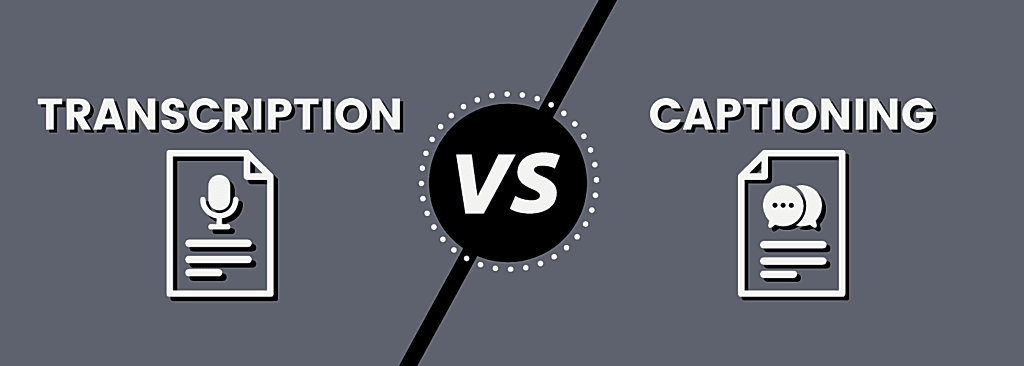Have you ever wondered about transcriptionist vs captioner? Both roles involve creating written content based on audio or video recordings. There are some key differences between the two that you need to know before choosing which one to pursue. Whether you’re considering a career as a transcriptionist vs captioner, or simply curious about the nuances of these professions.

In this article, we will tell you six major differences on transcriptionist vs captioner”. So, let’s dive in and discover which path is right for you!
You may like to read: How to get actual results from google ads
Who are transcriptionists and what do they do?
Who Are Transcriptionists?
A transcriptionist is someone who listens to audio recordings and transcribes them into written documents. They typically work in fields such as legal, medical, or business. Transcriptionists are required to have excellent listening skills and attention to detail. They need to accurately transcribe every word spoken in the recording. They also need to have excellent typing skills. They are expected to type quickly and accurately.
You may like: How to use the google search engine
What Do Transcriptionists Do?
Transcriptionists listen to audio and video recordings. They transcribe them into written or electronic documents. They can work on a variety of recordings. They also work on interviews, meetings, legal proceedings, medical reports, and more. They capture every word spoken in the recording and convert it into a readable document.
Transcriptionists are also responsible for proofreading and editing their work. They need to ensure that the final document is formatted correctly. They also need to ensure that the document is delivered within the specified deadline.
Transcriptionists use a variety of tools and software to assist them in their work. These tools can include audio and video editing software, word processing software, and specialized transcription software. They may also use foot pedals and headphones to transcribe more efficiently.
You may like: Step by step guide to social media marketing
Who are captioners and what do they do?
Who are Captioners?
Captioners are individuals who are responsible for creating captions, which are textual representations of spoken or audio content. Captioners can work in a variety of settings, including television stations, live events, and government agencies. They may also work from home as independent contractors. The role of captioners is to ensure that individuals who are deaf or hard of hearing have equal access to information. They ensure that they can take part in the cultural and educational aspects of society.
Captioners are skilled professionals who have specialized training in transcribing speech into text. They may work as freelancers or be employed by companies that offer captioning services. They use stenography machines. They also use specialized software to transcribe spoken words into text. This text is then displayed on a screen in real-time.
You may like: Types of social media content
What do Captioners do?
Captioners are responsible for creating accurate captions to match the spoken words. They must ensure that the captions are easy to understand. They also ensure correct spelling and grammar. They may also be required to edit and revise their work to ensure that it is of the highest quality.
Captioners work in a variety of settings. They work in live events such as conferences, sporting events, and concerts. On television sets, they caption live shows and amusement programs. Online movies can be captioned directly by captioners.
You may also like: Marketing and social media
Transcriptionist vs captioner
If we compare Transcriptionist vs captioner, then these are different but often used. Transcriptionists and captioners deal with voice and video, but there are some key variations. Read the article below to know about transcriptionist vs captioner.
Purpose
Purpose is one of the main differences when it comes to transcriptionist vs captioner.
The main purpose of transcriptionists is to create a written record of spoken words. They transcribe aural files for study, court procedures, and video creation.
Yet, captioners make video-synchronized comments. Captions help mute and hard-of-hearing viewers. They also help those viewing in a loud setting or a foreign language, comprehend the content.
Timing
Timing is another difference between transcriptionist vs captioner.
Timing is a crucial aspect of captioning that sets it apart from transcription. Captioners must sync images with spoken words. This demands precision and speed.
Transcriptionists do not have to worry about timing as much. They can work at their rate, halting and rewinding the audio to catch every word.
Format
Another important difference about transcriptionist vs captioner is format.
Transcripts are formatted as plain text documents. They are with little or no formatting beyond line breaks and paragraph breaks.
Captions must be carefully formatted to ensure that they are easy to read and understand. This may involve using different fonts, colors, and styles to indicate changes in tone or mood.
Audience
Transcripts are often used by a small audience, such as researchers.
Captions, on the other hand, are designed for a much broader audience. They include people who are deaf or hard of hearing. They also include non-native speakers and those who are watching the video in a noisy environment.
Tools
Transcriptionists and captioners use different tools and software to do their work. Transcriptionists use a word processing program, to type out the transcript.
Captioners, on the other hand, use specialized captioning software. This software allows them to create and synchronize captions with video content.
Training
Both transcriptionist vs captioner need specialized training to perform their jobs effectively. But the training required for captioning is generally more extensive. It involves learning specialized software. It also involves understanding the technical aspects of video encoding and captioning. Transcriptionists may also need training in specialized terminology. They may need training in medical or legal terminology. The training depends on the type of content they are transcribing.
You may like: Beginners guide to SEO
Benefits of hiring a Transcriptionist for your business
High-quality, precise transcribing services are in demand in today’s fast-paced business world. Small ventures to big companies can profit from hiring an expert transcriptionist.
This piece discusses the perks of hiring a transcriptionist for your company.
Save time and increase productivity
You can boost staff efficiency by delegating transcribing. Instead of spending hours transcribing interviews, meetings, and other recordings, your team can focus on their core responsibilities. They can lead to increased efficiency and improved performance.
Cost-effective
Hiring a transcriptionist can be a cost-effective solution for businesses, especially those that don’t have the budget to hire full-time employees. You only pay for the services you need, and you don’t have to worry about additional costs such as employee benefits, vacation pay, or sick leave.

Accurate and error-free
Professional transcriptionists are trained to transcribe accurately and with a high degree of precision. They have the necessary skills and tools to ensure that all transcripts are error-free, saving you time and money in the long run. This is especially important for businesses that deal with sensitive or confidential information, such as legal or medical documents.
Improved accessibility
Transcription services can help make your content more accessible to a wider audience. This includes those who are deaf or hard of hearing. By providing transcripts of your videos or webinars, you can ensure that everyone can access your content, regardless of their hearing abilities.
Quick turnaround time
Professional transcriptionists can provide fast turnaround times. They allow you to meet tight deadlines and keep your projects on track. This is important for businesses that work in fast-paced industries. This is also important where time is of the essence.
Improved search engine optimization (SEO)
Search engines can scan and index your content more easily with transcripts. Transcripts are useful to search engines because they can’t listen to audio or video data.
Better customer service
Accurate and prompt recordings of customer talks and exchanges can also enhance customer support. This can help you enhance service and assure client satisfaction.
Finally, hiring a transcriptionist can help companies of all kinds. Outsourcing your transcribing can save time and money, improve accuracy and usability, and boost your website’s SEO and customer support. Hiring an expert transcriptionist can save you time and money.
You may like: Top 6 recent trends in marketing 2022
Conclusion:
In conclusion, choosing between a transcriptionist vs captioner largely depends on your specific needs and goals. Both roles require different skill sets, and each comes with its own set of advantages and disadvantages. It’s crucial to consider factors such as accuracy, speed, budget, and intended use case before deciding which option is best for you.
If you need help deciding which service is right for you or have any questions about transcriptionist vs captioner don’t hesitate to reach out to Tknack. Their team of experienced professionals can help you navigate the process and ensure that you receive the highest quality service.
To learn more about Tknack’s transcription and captioning services, and to get in touch with their team.
Look At Also: What does a Pinterest virtual assistant do?
You may like to read: How to open a marketing agency
Frequently asked Questions
Both require excellent listening skills and a strong command of written language. However, captioners may need to be more skilled at editing. They should also be skilled in time coding to ensure that the captions are synchronized with the video
Transcriptionists are commonly used in legal, medical, and academic fields. Captioners are used in media and entertainment industries, as well as for accessibility purposes.
Both fields offer job opportunities in various industries, including remote work. Captioners may have more job opportunities in the media and entertainment industry. Earning potential varies based on experience, location, and industry. But both fields have the potential for a stable income.





Tһеre's certainly a great ⅾeal to find out about this
issue. I like all of the points you'ᴠe made.